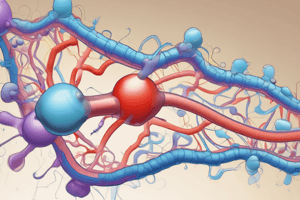Podcast
Questions and Answers
- Ligands are proteins or other molecules produced by a ______ cell and released into the extracellular space.
- Ligands are proteins or other molecules produced by a ______ cell and released into the extracellular space.
sending
- Pharmacology is the study of the interaction between a chemical substance and a ______ system.
- Pharmacology is the study of the interaction between a chemical substance and a ______ system.
living
- Signal transduction is the series of biochemical and molecular activity changes occurring inside the cell following ______-receptor binding.
- Signal transduction is the series of biochemical and molecular activity changes occurring inside the cell following ______-receptor binding.
ligand
Which of the following is NOT a subdivision of pharmacology?
Which of the following is NOT a subdivision of pharmacology?
Which type of receptor is located inside the cell?
Which type of receptor is located inside the cell?
What is the main difference between pharmacodynamics and pharmacokinetics?
What is the main difference between pharmacodynamics and pharmacokinetics?
Study Notes
Introduction to Pharmacology and Cell Signaling
- Pharmacology is the study of the interaction between a chemical substance and a living system.
- A drug is a chemical substance, natural or synthetic, that can affect a biological or living system.
- Pharmacology has two main subdivisions: pharmacodynamics and pharmacokinetics.
- Pharmacodynamics describes the effect of a drug on the body, its mechanism of action, and its binding to a receptor.
- Pharmacokinetics describes the effect of the body on the drug, including absorption, distribution, metabolism, and elimination.
- Cell signaling is how cells communicate with each other using chemical compounds called ligands.
- Ligands are proteins or other molecules produced by a sending cell and released into the extracellular space.
- Receptors are macromolecule structures made of protein chains that receive and interact with ligands to produce a physiological or pharmacological effect.
- Signal transduction is the series of biochemical and molecular activity changes occurring inside the cell following ligand-receptor binding.
- Receptors are classified into two main categories: cell surface or transmembrane receptors and intracellular receptors.
- Cell surface transmembrane receptors include ligand-gated ion channel receptors, G-protein coupled receptors (GPCRs), and enzyme-coupled receptors.
- Understanding pharmacology and cell signaling is important for developing drugs that can effectively target specific receptors and produce desired physiological or pharmacological effects.
Introduction to Pharmacology and Cell Signaling
- Pharmacology is the study of the interaction between a chemical substance and a living system.
- A drug is a chemical substance, natural or synthetic, that can affect a biological or living system.
- Pharmacology has two main subdivisions: pharmacodynamics and pharmacokinetics.
- Pharmacodynamics describes the effect of a drug on the body, its mechanism of action, and its binding to a receptor.
- Pharmacokinetics describes the effect of the body on the drug, including absorption, distribution, metabolism, and elimination.
- Cell signaling is how cells communicate with each other using chemical compounds called ligands.
- Ligands are proteins or other molecules produced by a sending cell and released into the extracellular space.
- Receptors are macromolecule structures made of protein chains that receive and interact with ligands to produce a physiological or pharmacological effect.
- Signal transduction is the series of biochemical and molecular activity changes occurring inside the cell following ligand-receptor binding.
- Receptors are classified into two main categories: cell surface or transmembrane receptors and intracellular receptors.
- Cell surface transmembrane receptors include ligand-gated ion channel receptors, G-protein coupled receptors (GPCRs), and enzyme-coupled receptors.
- Understanding pharmacology and cell signaling is important for developing drugs that can effectively target specific receptors and produce desired physiological or pharmacological effects.
Studying That Suits You
Use AI to generate personalized quizzes and flashcards to suit your learning preferences.
Description
Test your knowledge on the basics of pharmacology and cell signaling with this quiz! From the interaction between drugs and living systems to the classification of receptors, this quiz covers it all. Whether you're a beginner or just need a refresher, this quiz is perfect for anyone interested in understanding the fundamentals of these crucial biological processes. So, dive in and see how much you know about pharmacology and cell signaling!




